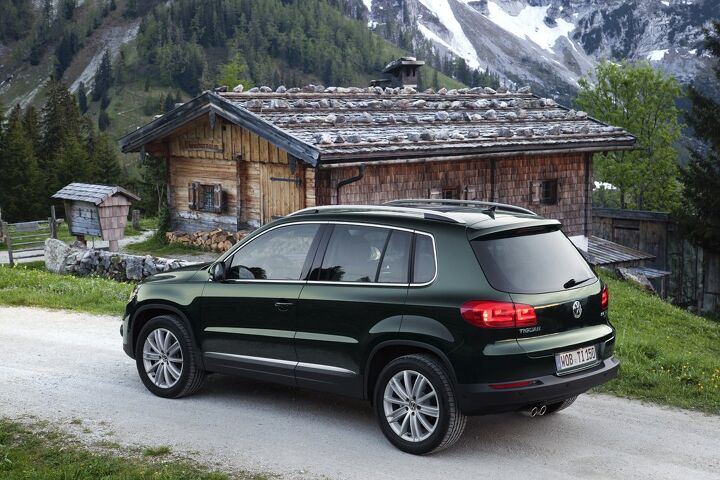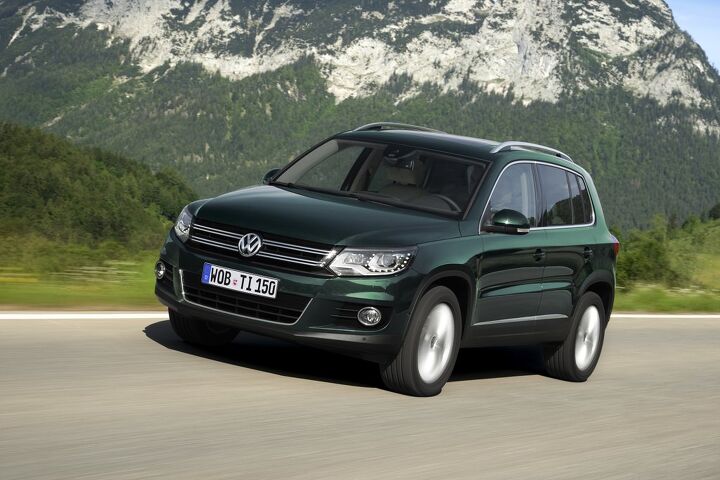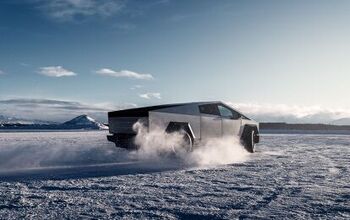Volkswagen Announces New Tiguan. TTAC Gives You The Pictures

Today, Volkswagen officially showed its new, well, “perfected” Tiguan to the press. VeeDub unabashedly calls it an “SUV with design parallels to the larger Touareg.” Unlike its larger sibling, the Tiguan can be driven guilt-free: With a 2.0 TDI engine, the SUV needs only 5.3 liters per 100 km. Which converts to a non-EPA mileage of 44.4 mpg. Not bad for a trucklet. Volkswagen humbly calls it “one of the most fuel-efficient SUVs in the world.” Gallery after the jump …
In Germany, the new Tiguan will arrive in mid-June; other European countries will follow at the beginning of August, overseas markets will get the new Tiguan by end of August.
The Tiguan is still the only SUV in its class that can be ordered in two different versions: one for on-road use and one specially tuned for off-road driving. “On-road” has an 18 degree angle of approach, “Off-road” 28 degrees.
The new model received new electronic doo-dads, such as Fatigue Detection, a camera-based main beam control systems Light Assist (H7 lights) and Dynamic Light Assist (bi-xenon headlights), as well as the Lane Assist lane-keeping system. Even the differential lock is no down electronically.
In Europe, the Tiguan can be ordered with the usual bewildering panoply of engines. Seven are on the menu, from 110 PS to 210 PS, three diesels, four for gasoline.

Bertel Schmitt comes back to journalism after taking a 35 year break in advertising and marketing. He ran and owned advertising agencies in Duesseldorf, Germany, and New York City. Volkswagen A.G. was Bertel's most important corporate account. Schmitt's advertising and marketing career touched many corners of the industry with a special focus on automotive products and services. Since 2004, he lives in Japan and China with his wife <a href="http://www.tomokoandbertel.com"> Tomoko </a>. Bertel Schmitt is a founding board member of the <a href="http://www.offshoresuperseries.com"> Offshore Super Series </a>, an American offshore powerboat racing organization. He is co-owner of the racing team Typhoon.
More by Bertel Schmitt
Latest Car Reviews
Read moreLatest Product Reviews
Read moreRecent Comments
- Jalop1991 In a manner similar to PHEV being the correct answer, I declare RPVs to be the correct answer here.We're doing it with certain aircraft; why not with cars on the ground, using hardware and tools like Telsa's "FSD" or GM's "SuperCruise" as the base?Take the local Uber driver out of the car, and put him in a professional centralized environment from where he drives me around. The system and the individual car can have awareness as well as gates, but he's responsible for the driving.Put the tech into my car, and let me buy it as needed. I need someone else to drive me home; hit the button and voila, I've hired a driver for the moment. I don't want to drive 11 hours to my vacation spot; hire the remote pilot for that. When I get there, I have my car and he's still at his normal location, piloting cars for other people.The system would allow for driver rest period, like what's required for truckers, so I might end up with multiple people driving me to the coast. I don't care. And they don't have to be physically with me, therefore they can be way cheaper.Charge taxi-type per-mile rates. For long drives, offer per-trip rates. Offer subscriptions, including miles/hours. Whatever.(And for grins, dress the remote pilots all as Johnnie.)Start this out with big rigs. Take the trucker away from the long haul driving, and let him be there for emergencies and the short haul parts of the trip.And in a manner similar to PHEVs being discredited, I fully expect to be razzed for this brilliant idea (not unlike how Alan Kay wasn't recognized until many many years later for his Dynabook vision).
- B-BodyBuick84 Not afraid of AV's as I highly doubt they will ever be %100 viable for our roads. Stop-and-go downtown city or rush hour highway traffic? I can see that, but otherwise there's simply too many variables. Bad weather conditions, faded road lines or markings, reflective surfaces with glare, etc. There's also the issue of cultural norms. About a decade ago there was actually an online test called 'The Morality Machine' one could do online where you were in control of an AV and choose what action to take when a crash was inevitable. I think something like 2.5 million people across the world participated? For example, do you hit and most likely kill the elderly couple strolling across the crosswalk or crash the vehicle into a cement barrier and almost certainly cause the death of the vehicle occupants? What if it's a parent and child? In N. America 98% of people choose to hit the elderly couple and save themselves while in Asia, the exact opposite happened where 98% choose to hit the parent and child. Why? Cultural differences. Asia puts a lot of emphasis on respecting their elderly while N. America has a culture of 'save/ protect the children'. Are these AV's going to respect that culture? Is a VW Jetta or Buick Envision AV going to have different programming depending on whether it's sold in Canada or Taiwan? how's that going to effect legislation and legal battles when a crash inevitibly does happen? These are the true barriers to mass AV adoption, and in the 10 years since that test came out, there has been zero answers or progress on this matter. So no, I'm not afraid of AV's simply because with the exception of a few specific situations, most avenues are going to prove to be a dead-end for automakers.
- Mike Bradley Autonomous cars were developed in Silicon Valley. For new products there, the standard business plan is to put a barely-functioning product on the market right away and wait for the early-adopter customers to find the flaws. That's exactly what's happened. Detroit's plan is pretty much the opposite, but Detroit isn't developing this product. That's why dealers, for instance, haven't been trained in the cars.
- Dartman https://apnews.com/article/artificial-intelligence-fighter-jets-air-force-6a1100c96a73ca9b7f41cbd6a2753fdaAutonomous/Ai is here now. The question is implementation and acceptance.
- FreedMike If Dodge were smart - and I don't think they are - they'd spend their money refreshing and reworking the Durango (which I think is entering model year 3,221), versus going down the same "stuff 'em full of motor and give 'em cool new paint options" path. That's the approach they used with the Charger and Challenger, and both those models are dead. The Durango is still a strong product in a strong market; why not keep it fresher?

















































Comments
Join the conversation
In separate releases Mazda has stated (as it concerns N.A.): 1. in 2012 it's Sky-D diesel engine will debut in a model not yet specified 2. the upcoming CX-5 will be available with the Sky-D engine 3. the CX-5 will debut in 2012 I think there's a very good chance Mazda will be the first to the North American market with a diesel in this segment.
In Canada, the AWD version starts at $38,000. And you don't even get a low range. You only get some sort of lockable differential, which will tend to break tire traction while cornering on slippery surfaces. Good thing it comes with all sorts of safety systems. I can find no evidence that the "off-road" version is currently available in Canada.